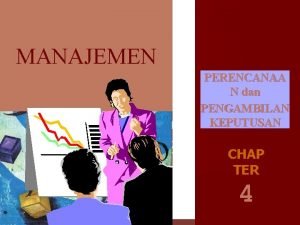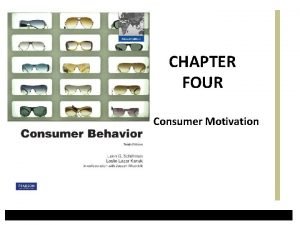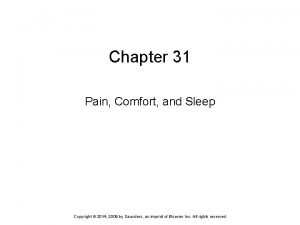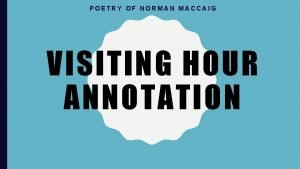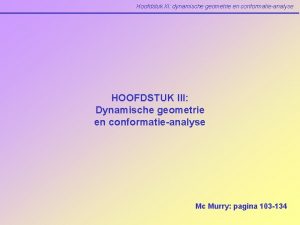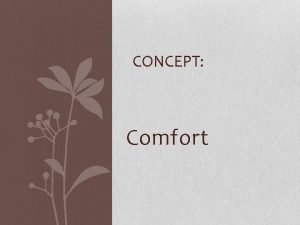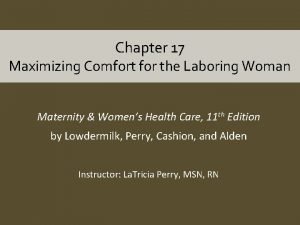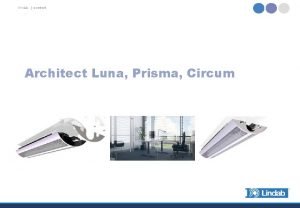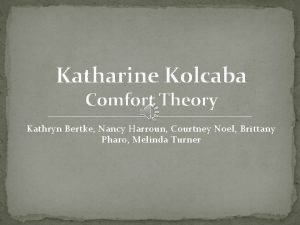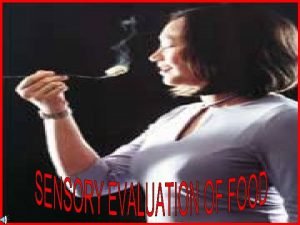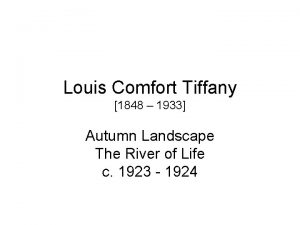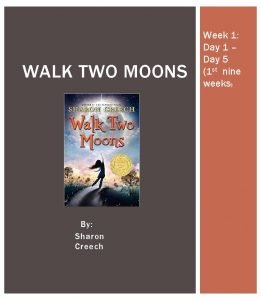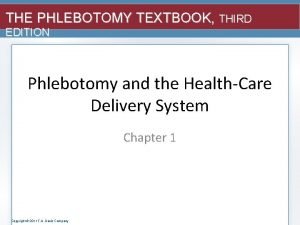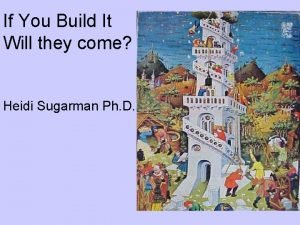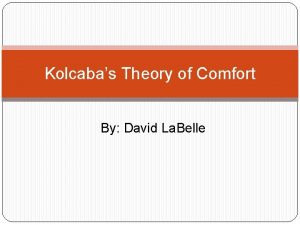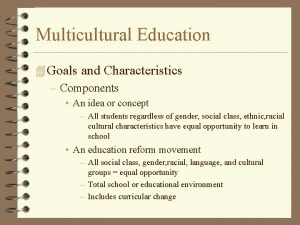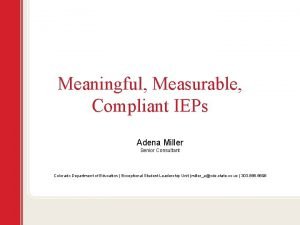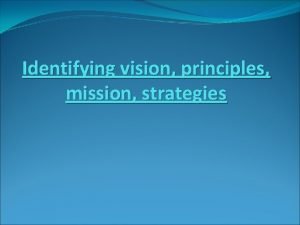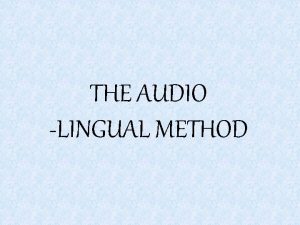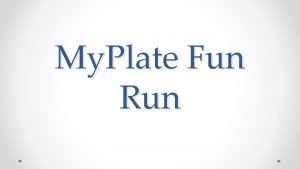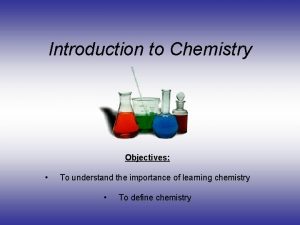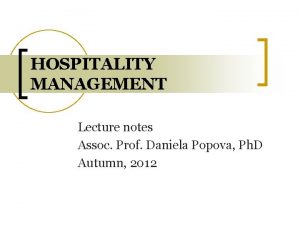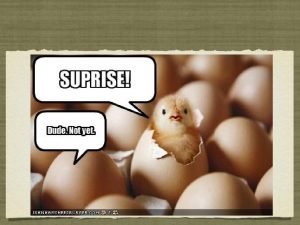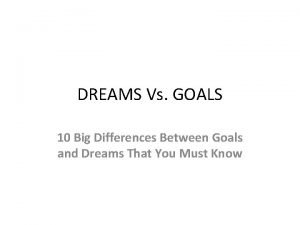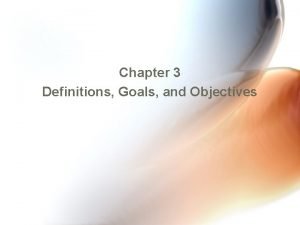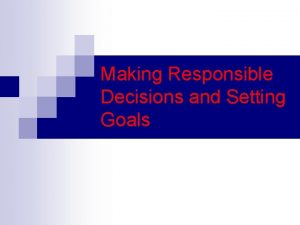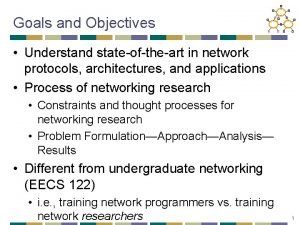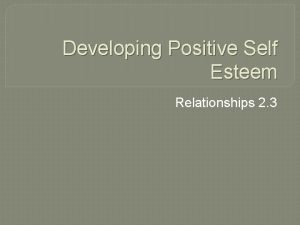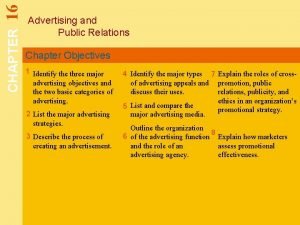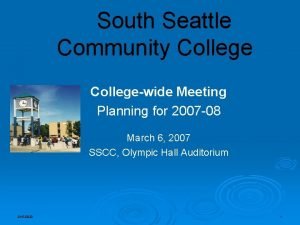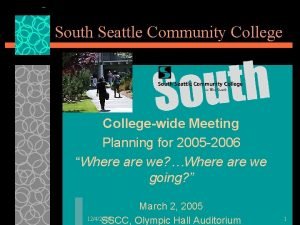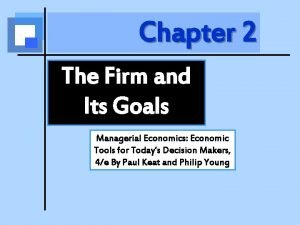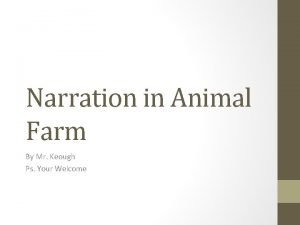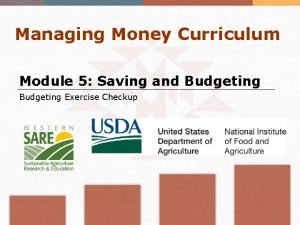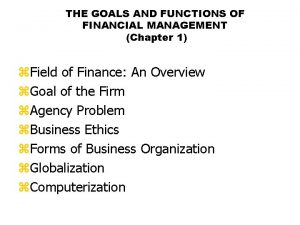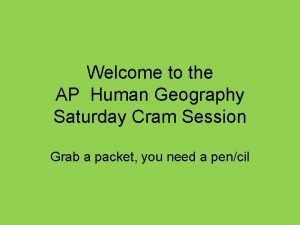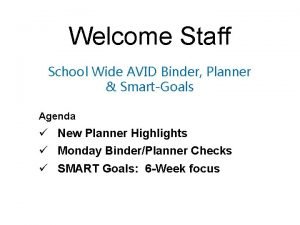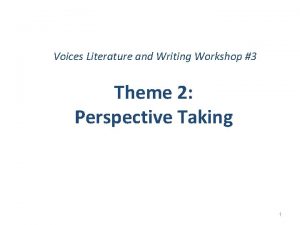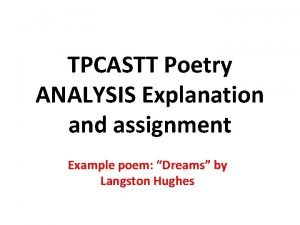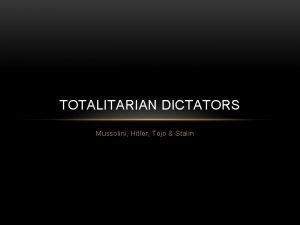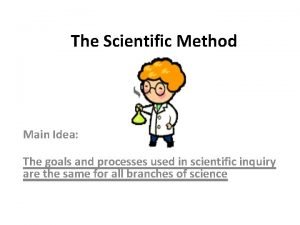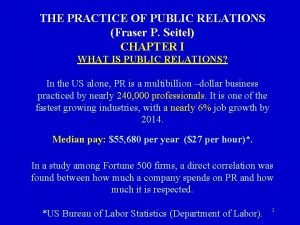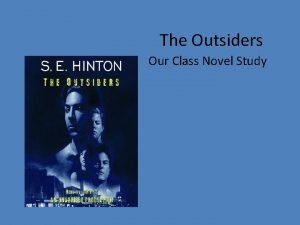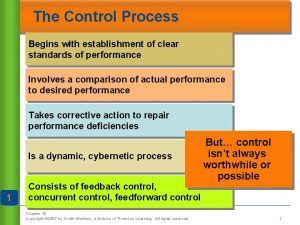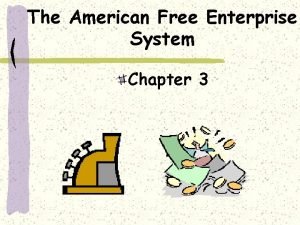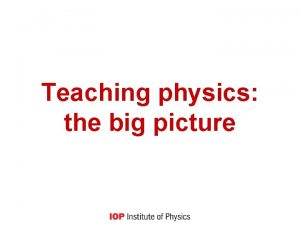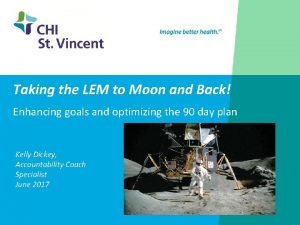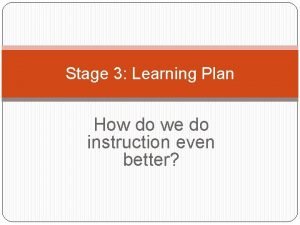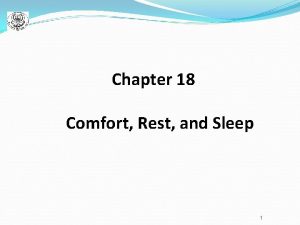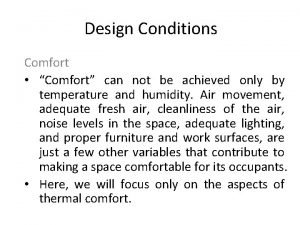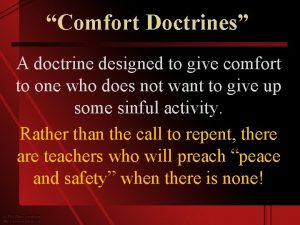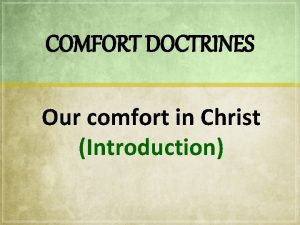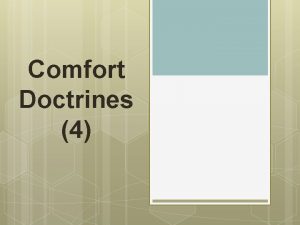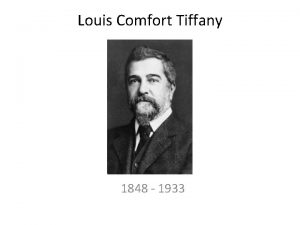Writing Goals Comfort with writing and the writing






















![Application • Rhetorical Situation (occasion, content, purpose, rhetorical (Aristotelian) triangle[speaker{persona}, audience, subject]): • Construct Application • Rhetorical Situation (occasion, content, purpose, rhetorical (Aristotelian) triangle[speaker{persona}, audience, subject]): • Construct](https://slidetodoc.com/presentation_image_h/819621919dbadd536cc879ae3281684f/image-23.jpg)



































































































































































- Slides: 186

Writing Goals • Comfort with writing and the writing process. • Confidence as a writer and reader. • Consciousness as a reader and writer to identify and use rhetorical devices. • Critical analysis skills to analyze text (writings), including your own.

Purpose of Writing • THINKING • READING • WRITING!

Reading and Writing Analytically It’s everywhere • All textual analysis is ultimately rhetorical analysis. • What people call “literary, ” “stylistic, ” or “discourse” analysis when it is done well it is a subset or rhetorical analysis. • Teachers conduct rhetorical analysis of readings and YOUR own writing.

Reading and Writing Analytically It’s historical • The practice of reading and writing analytically can be grounded in a body of theory from classical rhetoric – it’s been around for about 2, 500 years. • As the initial quote from Aristotle makes clear, it is about DISCOVERY!

Reading and Writing Analytically It’s historical • “So let rhetoric be defined as the faculty of discovering in the particular case what are the available means of persuasion. ” - Aristotle On Rhetoric, 1355 bc

Reading and Writing Analytically You already do it • Reading analytically is something most thoughtful people do every day. • “Twelve year olds debating the merits of a Michael Jackson concert or a Marey Carey video are making the same kinds of claims, counterclaims, and value judgments as those made by published book reviewers and media critics. ” ▫ Gerald Graff

Reading and Writing Analytically For Example: “It stinks!” • Is this analytical? • Yes, as long as justification is provided. �Lame dance moves �Corny song lyrics �Out dated costumes • Translates into analysis of news articles, creditcard pitches, and political ads.

Reading and Writing Analytically The Basics: What and How • Reading and writing analytically are not rocket science. • To read and write analytically means to examine a text in order: ▫ to determine WHAT its meanings, purposes, and effects are ▫ to show HOW its parts work together to achieve those meanings, purposes, and effects.

Reading and Writing Analytically Why Do It? • Reading and writing analytically is “the good citizen stuff” as well as “the good student stuff. ” • Good citizen/students need to know: ▫ ▫ What authors are saying in their writings How texts work on them How arguments are constructed How to use rhetoric • Why? “So we won’t get fooled again…”

Analysis has 2 areas: • What are the ▫ Meanings? ▫ Purpose? ▫ Effects? • How do the parts work together to achieve this?

Reading and Writing Analytically How to Do It? • Go old school • Aristotle’s Rhetoric

What is rhetoric? • “Rhetorical analysis (reading or writing) is an effort to understand how people within specific social situations attempt to influence others through language. ” -Jack Selzer • The specific features of texts that cause them to be meaningful, purposeful, and effective for readers or listeners in a given situation. • Ultimately, everything is an argument.

Rhetoric is • the faculty = ability • of finding = search & discover • all available means = language • of persuasion shape thoughts = • in a particular case= ▫ -Aristotle specific situation

The faculty: • Take one minute to free write. • Free write means continually write, without stopping what ever comes to mind. If you get stuck just keep writing stuck ‘til a new idea crops up. • Write your thoughts, experiences, and/or feelings about READING AND WRITING!

The faculty (continued) • If you believe you will never be any good at writing, speaking, or analyzing because you simply were not born with these “innate” talents…NONSENSE! • Aristotle has been saying for 2, 500 years that these are teachable arts, and people can get better at them.

of finding: • To Aristotle, rhetoric was dominated by invention. • A systematic process of finding and solving problems. • Rhetorical analysts must be consistently and systematically searching. • Searching for what?

all available means: • Search to discover ALL the things a writer or speaker has done in the text to shape people’s thoughts and actions. • That is, to achieve meaning, purpose and effect.

of persuasion: • Appeals: logical, emotional, personal. • First and foremost, a writer builds logical reasoning (logos) using EXAMPLES. • No matter how thoroughly a text emphasizes the character of the writer (ethos) or tugs on the emotions of the reader (pathos), logos provides the indispensable proof.

In a particular way: • Revealing how the writer capitalizes on unspoken assumptions he or she thinks the audience already believes about the issue at hand; incorporates facts, data, reasoning, and perspectives about the issue; and then substantiates a claim, a generalization, or a point about the issue.

Reading and Writing Analytically Again, How to Do It? Rhetorical Framework Soaps & SAS-flds

The Rhetorical Framework • Is made up of: • SOAPS - What • SAS – How ▫ FLDS - How

The Rhetorical Situation • Rhetors (writers and speakers) operate in specific situations. • There is an occasion to write about, an audience to address, and purpose for an outcome ( what the speaker or writer hopes the audience or reader will DO with the material presented).
![Application Rhetorical Situation occasion content purpose rhetorical Aristotelian trianglespeakerpersona audience subject Construct Application • Rhetorical Situation (occasion, content, purpose, rhetorical (Aristotelian) triangle[speaker{persona}, audience, subject]): • Construct](https://slidetodoc.com/presentation_image_h/819621919dbadd536cc879ae3281684f/image-23.jpg)
Application • Rhetorical Situation (occasion, content, purpose, rhetorical (Aristotelian) triangle[speaker{persona}, audience, subject]): • Construct and analyze a rhetorical situation for writing a review of a movie, video game, or concert. Be very specific in your analysis. What is your subject? What is your purpose? Who is your audience? What is your relationship to the audience? Remember, your need not write a full essay; just analyze the rhetorical situation.

SOAPS The Rhetorical Framework SPEAKER/WRITER Subject Occasion (Context) Audience Purpose Speaker Aristotle’s Rhetorical Triangle AUDIENCE SUBJECT OCCASION (CONTEXT) PURPOSE

SOAPS helps determine WHAT: • • • What the text means What is its purpose What effect the author intends Why the author was compelled to write Who the immediate audience is Now we have to determine the HOW?

Application 1 ▫ Einstein Letter (in class) Break down into the five areas of SOAPS Einstein’s letter to Phyllis Wright in response to her questions “Do scientists pray? And if so, what do they pray for? ”

Application 1 January 24, 1936 Dear Phyllis, I have tried to respond to your question as simply as I could. Here is my answer. Scientific research is based on the idea that everything that takes place is determined by laws of nature, and therefore this holds for the actions of people. For this reason, a research scientist will hardly be inclined to believe that events could be influenced by a prayer, i. e. , by a wish addressed to a supernatural being. However, it must be admitted that our actual knowledge of the laws is only imperfect and fragmentary, so that, actually, the belief in the existence of basic all-embracing laws in Nature also rests on a sort of faith.

Application 1 All the same this faith has been largely justified so far by the success of scientific research. But, on the other hand, everyone who is seriously involved in the pursuit of science becomes convinced that a spirit is manifest in the laws of the Universe – a spirit vastly superior to that of man, and one in the face of which we with our modest powers must feel humble. In this way the pursuit of science leads to a religious feeling of a special sort, which is indeed quite different from the religiosity of someone more naïve. I hope this answers your question. Best wishes, Albert Einstein

Application 2 Use SOAPS to analyze President Bush’s 9/11 speech. Good evening. Today, our fellow citizens, our way of life, our very freedom came under attack in a series of deliberate and deadly terrorist acts. The victims were in airplanes or in their offices -- secretaries, businessmen and women, military and federal workers. Moms and dads. Friends and neighbors. Thousands of lives were suddenly ended by evil, despicable acts of terror. The pictures of airplanes flying into buildings, fires burning, huge structures collapsing, have filled us with disbelief, terrible sadness and a quiet, unyielding anger. These acts of mass murder were intended to frighten our nation into chaos and retreat. But they have failed. Our country is strong. A great people has been moved to defend a great nation.

Application 2 Terrorist attacks can shake the foundations of our biggest buildings, but they cannot touch the foundation of America. These acts shatter steel, but they cannot dent the steel of American resolve. America was targeted for attack because we're the brightest beacon for freedom and opportunity in the world. And no one will keep that light from shining. Today, our nation saw evil, the very worst of human nature, and we responded with the best of America, with the daring of our rescue workers, with the caring for strangers and neighbors who came to give blood and help in any way they could. Immediately following the first attack, I implemented our government's emergency response plans. Our military is powerful, and it's prepared. Our emergency teams are working in New York City and Washington, D. C. , to help with local rescue efforts. Our first priority is to get help to those who have been injured and to take every precaution to protect our citizens at home and around the world from further attacks.

Application 2 The functions of our government continue without interruption. Federal agencies in Washington which had to be evacuated today are reopening for essential personnel tonight and will be open for business tomorrow. Our financial institutions remain strong, and the American economy will be open for business as well. The search is underway for those who are behind these evil acts. I've directed the full resources for our intelligence and law enforcement communities to find those responsible and bring them to justice. We will make no distinction between the terrorists who committed these acts and those who harbor them.

Application 2 I appreciate so very much the members of Congress who have joined me in strongly condemning these attacks. And on behalf of the American people, I thank the many world leaders who have called to offer their condolences and assistance. America and our friends and allies join with all those who want peace and security in the world and we stand together to win the war against terrorism. Tonight I ask for your prayers for all those who grieve, for the children whose worlds have been shattered, for all whose sense of safety and security has been threatened. And I pray they will be comforted by a power greater than any of us spoken through the ages in Psalm 23: "Even though I walk through the valley of the shadow of death, I fear no evil, for You are with me. "

Application 2 This is a day when all Americans from every walk of life unite in our resolve for justice and peace. America has stood down enemies before, and we will do so this time. None of us will ever forget this day, yet we go forward to defend freedom and all that is good and just in our world. Thank you. Good night and God bless America.

Rhetorical Paragraph Example #1 push yourself • The subject is September 11, 2001. The purpose of the speech is to talk about what happened on September 11, 2001. The audience is the American public. Bush’s relationship to the audience is he is the President of the United States. The occasion is a terrorist attack.

Rhetorical Paragraph Example #2 formal structure • On the night of September 11, 2001, after the 9/11 attacks, President Bush gave a speech. His purpose was to inform & reassure all of the citizens of America that our country still stands & will not be taken down by these terrorists. President Bush was not only speaking to his citizens, but to the entire world. He showed other countries that just because America got attacked, they are not a weak nation. President Bush was certain that America is a strong nation & he was determined to bounce back quickly.

Rhetorical Paragraph Example #3 vary sentences • President George W. Bush is speaking about the terrorist attacks on the World Trade Center on September 11, 2001. He is addressing the citizens of America: business men and women, firefighters, police officers, and families. This speech is utilized to comfort America, reflect on this monumental event, and spur the country onwards. President Bush is taking his role of leadership, giving citizens someone to trust and someone to look to as their world seemingly crumbles.

Rhetorical Paragraph Example #4 stick to the information provided • President George Bush addressed the public after the tragic events taken place on 9 -11 -2001. Most United States citizens were traumatized to see 2 planes flown onto the World Trade Center, as well as other plane flow into the Pentagon and local area. President Bush wanted to inform America to overcome this event and to let them know that they were ordering a defensive army to seek vengeance and as well as order against the Al-Qaeda, the terrorist group responsible for 911. In his speech, he offered condolences to those who witnessed it, and further security to the U. S. citizens that he will not let anything like that happen on the soil again.

Rhetorical Paragraph Example SOAPS • On the evening of September 11, 2001, after the terrorist attacks in New York, Washington D. C. , and Pennsylvania, President George W. Bush gave a speech not only to the American people, but to the world as well. Its purpose was twofold. To the American people, he explained the events of the day and the action that was taken; he also strengthened American resolve, assuring the public that both government and business will continue to work. President Bush also reminded the world of the greatness and resolve of America and warned those that did the attack as well as those who may harbor them that the victims of the attack will be avenged.

Rhetorical Paragraph Example SOAPS • On the evening of September 11, 2001, after the terrorist attacks in New York, Washington D. C. , and Pennsylvania, President George W. Bush gave a speech not only to the American people, but to the world as well. Its purpose was twofold. To the American people, he explained the events of the day and the action that was taken; he also strengthened American resolve, assuring the public that both government and business will continue to work. President Bush also reminded the world of the greatness and resolve of America and warned those that did the attack as well as those who may harbor them that the victims of the attack will be avenged.

SOAPS helps determine WHAT: • • • What the text means What is its purpose What effect the author intends Why the author was compelled to write Who the immediate audience is Now we have to determine the HOW?

What is Analysis? • Reading aesthetically • Breaking apart text • Noting “how” an author achieves his/her purpose

How to Begin Analysis • PARAGRAPH #1: ▫ Touch on all of the following points: �What is the author’s subject matter? �What was the occasion? �Who is the intended audience? �What is the author’s purpose and/or tone? �Who is the speaker (the author’s persona)? �In other words, SOAPS

How to Continue Analysis • PARAGRAPHS #2 through end ▫ Using the text, explain how you came to the points addressed in Paragraph #1 ▫ Allow the text to serve as a organizational guide ▫ But again, HOW to do this? � SAS(Fl D S)

S A S(FL D S) determines HOW • • • How does the text MEAN? How does the text realize its purpose? How does it achieve its effects? How does it make the occasion clear? How does it address or evoke its audience? How does it announce its intentions?

STRUCTURE Organization: intro, body, conclusion (transitions) SAS Structure Appeals Style Modes of Discourse: definition, process, compare/contrast, divide/classify, cause/effect GENRE: essay, letter, speech, etc APPEALS LOGOS Logic/evidence ETHOS emotional PATHOS personal credibility STYLE Figurative Language, Diction, Syntax

STRUCTURE A S Structure includes how/why an author selects: • Organization patterns (chronological, spatial…) • Modes of Discourse (definition, process, compare/contrast, divide/classify, cause/effect) • Genre -usually added to subject (essay, speech, letter…)

Rhetorical Modes Sometimes Referred to as modes of discourse.

Narrative • Intention is to present an event to the readerwhat happened and how it happened. • May be. . . ▫ Short or long ▫ Factual or imagined ▫ May instruct and inform, or simply divert and amuse.

Descriptive Intention is to make the reader as vividly aware as possible of what the writer has perceived through the senses (or in his or her imagination), to give the “feel” of things described, the quality of direct

Two Purposes Descriptive (cont. ) Objective Description: ~ To convey information without bias or emotion Subjective Description: ~ To convey it with feeling

Expository Intention is to explain or expose something. ~ Function is to inform, to instruct, or to set forth ideas.

Expository Can be broken into 5 categories: 1. 2. 3. 4. 5. Comparison and Contrast Classification and Division Definition Process Cause and Effect

Argumentative Intention is to make the reader change his or her mind, attitude, point of view or feelings. ~ The terms “Argument” and “Persuasion” are often used interchangeably.

Argumentative Argument -aims to win readers’ agreement with an assertion or claim by engaging their powers of reasoning.

Argumentative Persuasion – aims to influence readers’ action, or their support for an action, by engaging their beliefs and feelings.

Argumentative Types – Polemic Rogerian Aristotelian Concession Counterargument/Refutation

STRUCTURE Organization: intro, body, conclusion (transitions) SAS Structure Appeals Style Modes of Discourse: definition, process, compare/contrast, divide/classify, cause/effect GENRE: essay, letter, speech, etc APPEALS LOGOS Logic/evidence ETHOS emotional PATHOS personal credibility STYLE Figurative Language, Diction, Syntax

S APPEALS S Appeals refers to the 3 Rhetorical Appeals: • Pathos (emotions) • Ethos (the believability of the author) • Logos (logical reasoning – the indispensable proof)

Application: Ethos ▫ ACTIVITY: Think of a situation in which you are presenting you view on the same subject to two different audiences. For instance, you might be presenting your ideas on ways to stop bullying (1) to the school board or PTL and (2) to a group of freshmen. Discuss how you would establish ethos in each situation.

Application: Logos Discuss George Will’s use of logos in the following article excerpt: King Coal: Reigning in China (excerpt) GEORGE F. WILL Thursday, December 30, 2010 Half of the 6 billion tons of coal burned globally each year is burned in China. A spokesman for the Sierra Club, which in recent years has helped to block construction of 139 proposed coal-fired plants in America, says, "This is undermining everything we've accomplished. " America, say environmentalists, is exporting global warming. Can something really be exported if it supposedly affects the entire planet? Never mind. America has partners in this crime against nature, if such it is. One Australian company proposes to build the Cowlitz facility; another has signed a $60 billion contract to supply Chinese power plants with Australian coal.

Application: Logos The Times says ships - all burning hydrocarbons - hauled about 690 million tons of thermal coal this year, up from 385 million in 2001. China, which imported about 150 million tons this year, was a net exporter of coal until 2009, sending abroad its low-grade coal and importing higher-grade, lowsulfur coal from, for example, the Powder River Basin of Wyoming and Montana. Because much of China's enormous coal reserves is inland, far from coastal factories, it is sometimes more economical to import American and Australian coal. Writing in the Atlantic on China's appetite for coal and possible aptitude for using the old fuel in new, cleaner ways, James Fallows quotes a Chinese official saying that the country's transportation system is the only serious limit on how fast power companies increase their use of coal. One reason China is building light-rail systems is to get passenger traffic out of the way of coal trains. Fallows reports that 15 years from now China expects that 350 million people will be living in cities that do not exist yet. This will require adding to China's electrical system a capacity almost as large as America's current capacity. The United States, China, Russia and India have 40 percent of the world's population and 60 percent of its coal.

Application: Pathos President Nixon’s Checkers Speech “One other thing I probably should tell you because if we don’t they’ll probably be saying this about me too, we did get something-a gift-after the election. A man down in Texas heard Pat on the radio mention the fact that our two youngsters would like to have a dog. And, believe it or not, the day before we left on this campaign trip we got a message from Union Station in Baltimore saying they had a package for us. We went down to get it. You know what it was. It was a little cocker spaniel dog in a crate that he’d sent all the way from Texas. Black and white spotted. And our little girl. Tricia, the 6 -year old-named it Checkers. And you know, the kids, like all kids, love the dog and I just want to say this right now, that regardless of what they say about it, we’re gonna keep it. ”

Application: Pathos

Application: Pathos Eisenhower D-Day speech “Soldiers, Sailors and Airmen of the Allied Expeditionary Force! You are about to embark upon a great crusade, toward which we have striven these many months. The eyes of the world are upon you. The hopes and prayers of liberty loving people everywhere march with you. In company with our brave Allies and brothers in arms on other fronts, you will bring about the destruction of the German war machine, the elimination of Nazi tyranny over the oppressed peoples of Europe, and security for ourselves in a free world. Your task will not be an easy one. Your enemy is well trained, well equipped and battle hardened, he will fight savagely.

Application: Pathos Eisenhower D-Day speech “But this is the year 1944! Much has happened since the Nazi triumphs of 1940 -41. The United Nations have inflicted upon the Germans great defeats, in open battle, man to man. Our air offensive has seriously reduced their strength in the air and their capacity to wage war on the ground. Our home fronts have given us an overwhelming superiority in weapons and munitions of war, and placed at our disposal great reserves of trained fighting men. The tide has turned! The free men of the world are marching together to victory! I have full confidence in your courage, devotion to duty and skill in battle. We will accept nothing less than full victory! Good Luck! And let us all beseech the blessings of Almighty God upon this great and noble undertaking.

Application: Putting It All Together Select one of the following rhetorical situations and discuss how you would establish your ethos and appeal to logos and pathos. �You are trying to persuade your parents that a ‘gap year’ – taking a year off of school between high school and college – will be beneficial. �You have been asked to make a presentation to the school’s principal and food service staff to propose healthier food choices in the cafeteria at a time when the overall school budget is constrained. �You are making the case for the purchase of a specific model and make of a car that will best fit your family’s needs and resources. �You are the student representative chosen to go before a group of local businesspeople to ask them to provide financial support for a proposed school trip.

Application: Putting It All Together ACTIVITY: Select one of the following advertisements from the World Wildlife Foundation, analyze the rhetorical situation and appeals used in the advertisement and assess its effectiveness.

Application: Putting It All Together ACTIVITY: Select one of the following advertisements from the World Wildlife Foundation, analyze the rhetorical situation and appeals used in the advertisement and assess its effectiveness.

STRUCTURE Organization: intro, body, conclusion (transitions) SAS Structure Appeals Style Modes of Discourse: definition, process, compare/contrast, divide/classify, cause/effect GENRE: essay, letter, speech, etc APPEALS LOGOS Logic/evidence ETHOS emotional PATHOS personal credibility STYLE Figurative Language, Diction, Syntax

S A Style = FL D S STYLE Figurative Language Diction Syntax

S A S(FIGURATIVE LANGUAGE D S) • Figurative Language includes: ▫ ▫ Simile/Metaphor Understatement/Hyperbole Paradox Irony

Apostrophe: Defined • A direct address to an abstraction (time, nature), a thing (night, the wind), or an imaginary or absent person (not physically present [God, Batman, Abraham Lincoln])

Apostrophe: • "Twinkle, twinkle, little star, How I wonder what you are. Up above the world so high, Like a diamond in the sky. " (Jane Taylor, "The Star, " 1806)

Apostrophe: • "O wind, rend open the heat, cut apart the heat, rend it to tatters. " (H. D. [Hilda Doolittle], "Heat, " 1915)

Apostrophe: • "Death be not proud, though some have called thee Mighty and dreadfull, for, thou art not so, For, those, whom thou think'st, thou dost overthrow, Die not, poore death, nor yet canst thou kill me. (John Donne, "Death be not proud")

Paradox/Oxymoron: Defined • A figure of speech in which a statement appears to contradict itself. Adjective: paradoxical.

Paradox/Oxymoron • The swiftest traveler is he that goes afoot. " ▫ (Henry David Thoreau, Walden, 1854) • "If you wish to preserve your secret, wrap it up in frankness. " ▫ (Alexander Smith, "On the Writing of Essays. " Dreamthorp, 1854)

Paradox/Oxymoron • "I have found the paradox, that if you love until it hurts, there can be no more hurt, only more love. " ▫ (Mother Teresa) • "War is peace. " "Freedom is slavery. " "Ignorance is strength. " ▫ (George Orwell, 1984)

Paradox/Oxymoron • The Paradox of Catch-22 "There was only one catch and that was Catch-22, which specified that concern for one's own safety in the face of dangers that were real and immediate was the process of a rational mind. Orr was crazy and could be grounded. All he had to do was ask; and as soon as he did, he would no longer be crazy and would have to fly more missions. Orr would be crazy to fly more missions and sane if he didn't, but if he was sane he had to fly them. If he flew them he was crazy and didn't have to; but if he didn't want to he was sane and had to. " ▫ (Joseph Heller, Catch-22, 1961)

Paradox/Oxymoron • "Some day you will be old enough to start reading fairy tales again. " ▫ (C. S. Lewis to his godchild, Lucy Barfield, to whom he dedicated The Lion, the Witch and the Wardrobe)

Litotes: Defined ( Lie-Ta-Tees) or (Lie-Toe-Tees) • A form of understatement in which a thing is affirmed by stating the negative of its opposite • Authors often use litotes to achieve an ironic effect

Litotes: Defined ( Lie-Ta-Tees) or (Lie-Toe-Tees) • Sometimes used synonymously with meiosis (intentional understatement for humorous or satiric effect)

Litotes • The test was “not bad. ” • A few unannounced quizzes are not inconceivable. • War is not healthy for children and other living things. • One nuclear bomb can ruin your whole day. (meiosis)

Litotes • "We made a difference. We made the city stronger, we made the city freer, and we left her in good hands. All in all, not bad at all. " ▫ (Ronald Reagan, Farewell Address to the Nation, January 20, 1989)

Litotes • "Are you also aware, Mrs. Bueller, that Ferris does not have what we consider to be an exemplary attendance record? " ▫ (Jeffrey Jones as Principal Ed Rooney, Ferris Bueller's Day Off, 1986)

Hyperbole: Defined • A figure of speech (a form of irony) in which exaggeration is used for emphasis or effect; an extravagant statement. Adjective: hyperbolic. Contrast with understatement.

Hyperbole • Principal Skinner: The things you don't know would fill a whole library and leave room for a few pamphlets. Superintendent Chalmers: There's no need for hyperbole, Seymour. ▫ ("Bart Stops to Smell the Roosevelts. " The Simpsons, October 2, 2011)

Hyperbole • "I was helpless. I did not know what in the world to do. I was quaking from head to foot, and could have hung my hat on my eyes, they stuck out so far. " ▫ (Mark Twain, "Old Times on the Mississippi")

Hyperbole • "Ladies and gentlemen, I've been to Vietnam, Iraq, and Afghanistan, and I can say without hyperbole that this is a million times worse than all of them put together. " ▫ (Kent Brockman, The Simpsons)

Hyperbole • "My toaster has never once worked properly in four years. I follow the instructions and push two slices of bread down in the slots, and seconds later they rifle upwards. Once they broke the nose of a woman I loved dearly. " ▫ (Woody Allen, "My Speech to the Graduates. " The New York Times, Aug. 10, 1979)

Hyperbole • "The trick to effective hyperbole is to give an original twist to obviously fanciful overstatement. 'I'd walk a million miles for one of your smiles' would no longer impress Mammy, but Raymond Chandler's 'She was blonde enough to make a bishop kick a hole through a stained-glass window' still has that crisp crunch of freshness. " ▫ (William Safire, How Not to Write: The Essential Misrules of Grammar. W. W. Norton, 1990)

Personification: Defined • A trope or figure of speech (generally considered a type ofmetaphor) in which an inanimate object or abstraction is given human qualities or abilities.

Personification • "Oreo: Milk’s favorite cookie. " (slogan on a package of Oreo cookies)

Personification • The wind stood up and gave a shout. He whistled on his fingers and Kicked the withered leaves about And thumped the branches with his hand And said he'd kill and kill, And so he will! ▫ (James Stephens, "The Wind")

Zeugma: Defined • the use of a word to modify or govern two or more words although its use may be grammatically or logically correct with only one.

Zeugma • "You are free to execute your laws, and your citizens, as you see fit. " ▫ (Star Trek: The Next Generation) • "Kill the boys and the luggage!" ▫ (Fluellen in William Shakespeare's Henry V)

Zeugma • "She arrived in a taxi and a flaming rage. " ▫ (John Lyons, Semantics. Cambridge Univ. Press, 1977) • "We were partners, not soul mates, two separate people who happened to be sharing a menu and a life. " ▫ (Amy Tan, The Hundred Secret Senses. Ivy Books, 1995)

Zeugma • "The theme of the Egg Hunt is 'learning is delightful and delicious'--as, by the way, am I. " ▫ (Allison Janney as C. J. Cregg in The West Wing) • "You held your breath and the door for me. " ▫ (Alanis Morissette, "Head over Feet")

Zeugma • "She lowered her standards by raising her glass, Her courage, her eyes and his hopes. " ▫ (Flanders and Swann, "Have Some Madeira, M'Dear")

Metonymy: Defined • A figure of speech in which one word or phrase is substituted for another with which it is closely associated (such as "crown" for "royalty"). • Metonymy is also the rhetorical strategy of describing something indirectly by referring to things around it, as in describing someone's clothing to characterize the individual.

Metonymy • "Many standard items of vocabulary are metonymic. A redletter day is important, like the feast days marked in red on church calendars. . On the level of slang, a redneck is a stereotypical member of the white rural working class in the Southern U. S. , originally a reference to necks sunburned from working in the fields. " ▫ (Connie Eble, "Metonymy. " The Oxford Companion to the English Language, 1992)

Metonymy • "Detroit is still hard at work on an SUV that runs on rain forest trees and panda blood. " ▫ (Conan O'Brien) •

Metonymy • "One of the favorite American metonymic processes is the one in which a part of a longer expression is used to stand for the whole expression. Here are some examples for the 'part of an expression for the whole expression' metonymy in American English: ▫ Danish for Danish pastry shocks for shock absorbers wallets for wallet-sized photos Ridgemont High for Ridgemont High School the States for the United States �(Zoltán Kövecses, American English: An Introduction. Broadview, 2000)

Metonymy • "Metaphor creates the relation between its objects, while metonymy presupposes that relation. " ▫ (Hugh Bredin, "Metonymy. " Poetics Today, 1984)

Metonymy • The suits on Wall Street walked off with most of our savings.

Synecdoche: Defined • (suh-NEK-duh-kee) • A figure of speech in which a part of something is used to represent the whole

Synecdoche: • Referring to a car as “wheels” • “We hope everyone will lend a hand in completing this project. ”

Euphemism: Defined • A device (figure of speech) in which indirectness replaces directness of statement, usually in an effort to avoid offensiveness

Euphemism: • “senior citizens” vs. “old people” • “in the family way” vs “pregnant • “rest room” vs. “toilet” • “pass away” vs. “die”

S A S(FL DICTION S) • Diction is the author’s choice of words and n Equivocation includes: n Fallacy – term having ▫ ▫ ▫ Word Choice Archaic diction Connotation Pun Jargon two or more meanings used to deceive or confuse(we bring our enemies to justice or we bring justice to them)

S A S(FL D SYNTAX) • Syntax is how the author constructs sentences and paragraphs including: ▫ Sentence types �Simple, compound, complex, compoundcomplex, �Periodic (main idea complete at the start) �Cumulative (main idea at the end) �Hortative (urges/calls to action) ▫ Parallel structure (many kinds)

Syntax • The arrangement – the ordering, grouping, and placement – of words within a sentence. • Syntax has also been viewed as one of the two components of diction (the other being vocabulary).

EXAMPLE: “I rode across the meadow. ” Vs. “Across the meadow rode I. ”

Periodic Sentence: Defined • A long and frequently involved sentence, marked by suspended syntax, in which the sense is not completed until the final word--usually with an emphatic climax. Contrast with cumulative sentence.

Periodic Sentence • "And though I have the gift of prophecy, and understand all mysteries, and all knowledge; and though I have all faith, so that I could remove mountains, and have not charity, I am nothing. " ▫ (The King James Bible, I Corinthians 13)

Periodic Sentence • "Democracy is that system of government under which people, having 60, 000 native-born adults to choose from, including thousands who are handsome and many who are wise, pick out a Coolidge to be head of state. It is as if a hungry man, set before a banquet prepared by master cooks and covering a table an acre in area, should turn his back upon the feast and stay his stomach by catching and eating flies. " ▫ (H. L. Mencken, "The Comedian")

Periodic Sentence • "Years and years ago, when I was a boy, when there wolves in Wales, and birds the color of red-flannel petticoats whisked past the harp-shaped hills, when we sang and wallowed all night and day in caves that smelt like Sunday afternoons in damp front farmhouse parlors, and we chased, with the jawbones of deacons, the English and the bears, before the motor car, before the wheel, before the duchess-faced horse, when we rode the daft and happy hills bareback, it snowed and it snowed. " ▫ (Dylan Thomas, A Child's Christmas in Wales, 1955)

Periodic Sentence • "The proper place in the sentence for the word or group of words that the writer desires to make most prominent is usually the end. " ▫ (William Strunk, Jr. , and E. B. White, The Elements of Style)

Cumulative Sentence: Defined • An independent clause followed by a series of subordinateconstructions (phrases or clauses) that gather details about a person, place, event, or idea. Contrast with periodic sentence.

Cumulative Sentence: • "The radiators put out lots of heat, too much, in fact, and old-fashioned sounds and smells came with it, exhalations of the matter that composes our own mortality, and reminiscent of the intimate gases we all diffuse. " (Saul Bellow, More Die of Heartbreak. William Morrow, 1987)

Cumulative Sentence: • "The San Bernardino Valley lies only an hour east of Los Angeles by the San Bernardino Freeway but is in certain ways an alien place: not the coastal California of the subtropical twilights and the soft westerlies off the Pacific but a harsher California, haunted by the Mojave just beyond the mountains, devastated by the hot dry Santa Ana wind that comes down through the passes at 100 miles an hour and whines through the eucalyptus windbreaks and works on the nerves. " (Joan Didion, "Some Dreamers of the Golden Dream. " Slouching Towards Bethlehem, 1968)

S A S(FL D SYNTAX) • Syntax is how the author constructs sentences and paragraphs including: ▫ Parallel structure (many kinds) anaphora �antimetabole �antithesis �asyndeton �inversion �juxtaposition �Parallelism �zeugma

Parallel Structure: Defined • Two or more words, phrases, or clauses that are similar in length and grammatical form.

Parallel Structure • "It is by logic we prove, but by intuition we discover. " ▫ (Leonardo da Vinci) • "Humanity has advanced, when it has advanced, not because it has been sober, responsible, and cautious, but because it has been playful, rebellious, and immature. " ▫ (Tom Robbins, Still Life with Woodpecker, 1980)

Parallel Structure • "If you are idle, be not solitary; if you are solitary, be not idle. " ▫ (Samuel Johnson, quoted by James Boswell in The Life of Samuel Johnson, 1791) • "Read not to contradict and confute; nor to believe and take for granted; nor to find talk and discourse; but to weigh and consider. " ▫ (Francis Bacon, "Of Studies, " 1625)

Parallel Structure • "I had been short, and now I was tall. I had been skinny and quiet and religious, and now I was good-looking and muscular. It was Sally Baldwin who brought me along, told me what to wear and do and think and say. She was never wrong; she never lost her patience. She created me, and when she was done we broke up in a formal sense, but she kept calling me. " ▫ (Jane Smiley, Good Faith. Alfred A, Knopf, 2003)

Parallel Structure • "Those who write clearly have readers; those who write obscurely have commentators. " ▫ (Albert Camus)

Anaphora: Defined • Repetition of a word, phrase, or clause at the beginning of two or more sentences in a row. This is a deliberate form of repetition and helps make the writer’s point more coherent.

Anaphora: "I needed a drink, I needed a lot of life insurance, I needed a vacation, I needed a home in the country. What I had was a coat, a hat and a gun. " (Raymond Chandler, Farewell, My Lovely, 1940) “We cannot dictate-we cannot consecrate- we cannot hallow this ground. ” (Abraham Lincoln – Gettysburg Address)

Anaphora: • "Anaphora will repeat an opening phrase or word; Anaphora will pour it into a mould (absurd)! Anaphora will cast each subsequent opening; Anaphora will last until it's tiring. " ▫ (John Hollander, Rhyme's Reason: A Guide to English Verse. Yale Univ. Press, 1989)

Anaphora: • "Of all the gin joints in all the towns in all the world, she walks into mine. " (Rick Blaine in Casablanca)

Anaphora: • "We shall go on to the end, we shall fight in France, we shall fight on the seas and oceans, we shall fight with growing confidence and growing strength in the air, we shall defend our Island, whatever the cost may be, we shall fight on the beaches, we shall fight on the landing grounds, we shall fight in the fields and in the streets, we shall fight in the hills; we shall never surrender. " ▫ (Winston Churchill, speech to the House of Commons, June 4, 1940)

Anaphora: • "It rained on his lousy tombstone, and it rained on the grass on his stomach. It rained all over the place. " ▫ (Holden Caulfield in J. D. Salinger's The Catcher in the Rye, 1951)

Anaphora: • "But one hundred years later, the Negro still is not free. One hundred years later, the life of the Negro is still sadly crippled by the manacles of segregation and the chains of discrimination. One hundred years later, the Negro lives on a lonely island of poverty in the midst of a vast ocean of material prosperity. One hundred years later, the Negro is still languishing in the corners of American society and finds himself an exile in his own land. And so we've come here today to dramatize a shameful condition. " ▫ (Dr. Martin Luther King, Jr. , "I Have a Dream, " 1963)

Epistrophe: Defined • A rhetorical term for the repetition of a word or phrase at the end of successive clauses.

Epistrophe • "A day may come when the courage of men fails, when we forsake our friends and break all bonds of fellowship, but it is not this day. An hour of woes and shattered shields, when the age of men comes crashing down! But it is not this day! This day we fight!" ▫ (Viggo Mortensen as Aragorn in The Lord of the Rings: The Return of the King, 2003)

Epistrophe • "Don't you ever talk about my friends! You don't know any of my friends. You don't look at any of my friends. And you certainly wouldn't condescend to speak to any of my friends. " ▫ (Judd Nelson as John Bender in The Breakfast Club, 1985) • "For no government is better than the men who compose it, and I want the best, and we need the best, and we deserve the best. " ▫ (Senator John F. Kennedy, speech at Wittenberg College, Oct. 17, 1960)

Epistrophe • "It is rather for us the living, we here be dedicated to the great task remaining before us--that from these honored dead we take increased devotion to that cause for which they here gave the last full measure of devotion--that we here highly resolve that these dead shall not have died in vain, that this nation shall have a new birth of freedom, and that government of the people, by the people, for the people shall not perish from the earth. " ▫ (Abraham Lincoln, The Gettysburg Address, Nov. 19, 1863)

Epistrophe • Bassanio: Sweet Portia, If you did know to whom I gave the ring, If you did know for whom I gave the ring And would conceive for what I gave the ring And how unwillingly I left the ring, When nought would be accepted but the ring, You would abate the strength of your displeasure. • Portia: If you had known the virtue of the ring, Or half her worthiness that gave the ring, Or your own honour to contain the ring, You would not then have parted with the ring. ▫ (William Shakespeare, The Merchant of Venice, Act 5, scene 1)

Epistrophe • "And close your eyes, child, and listen to what I'll tell you. Follow in the darkest night the sounds that may impel you. And the song that I am singing may disturb or serve to quell you. " ▫ (Jerry Merrick, "Follow, " as sung by Richie Havens on the album Mixed Bag, 1967)

Asyndeton: Defined • A condensed form of expression in which elements customarily joined by conjunctions are presented in series without conjunction. The parts are emphasized equally when the conjunction is omitted; in addition, the use of commas with no intervening conjunctions speeds up the flow of the sentence.

Asyndeton “veni, vidi, vici” (I came, I saw, I conquered. ) Julius Caesar “…government of the people, by the people, for the people…” Abraham Lincoln

Asyndeton • "He was a bag of bones, a floppy doll, a broken stick, a maniac. " ▫ (Jack Kerouac, On the Road, 1957) • "Joona walks through the Christmas market in Bollnäs Square. Fires are burning, horses are snorting, chestnuts are roasting. Children race through a stone maze, others drink hot chocolate. " ▫ (Lars Kepler, The Hypnotist. Trans. by Ann Long. Picador, 2011)

Asyndeton • "She was young, she was pure, she was new, she was nice, She was fair, she was sweet seventeen. He was old, he was vile, and no stranger to vice, He was base, he was bad, he was mean. He had slyly inveigled her up to his flat To view his collection of stamps. " ▫ (Flanders and Swann, "Have Some Madeira, M'Dear")

Asyndeton • "Anyway, like I was saying, shrimp is the fruit of the sea. You can barbecue it, boil it, broil it, bake it, saute it. Dey's uh, shrimpkabobs, shrimp creole, shrimp gumbo. Pan fried, deep fried, stirfried. There's pineapple shrimp, lemon shrimp, coconut shrimp, pepper shrimp, shrimp soup, shrimp stew, shrimp salad, shrimp and potatoes, shrimp burger, shrimp sandwich. That--that's about it. " ▫ (Bubba in Forrest Gump, 1994)

Asyndeton • "Fog everywhere. Fog up the river, where it flows among green aits and meadows; fog down the river, where it rolls deified among the tiers of shipping and the waterside pollutions of a great (and dirty) city. Fog on the Essex marshes, fog on the Kentish heights. Fog creeping into the cabooses of collier-brigs; fog lying out on the yards and hovering in the rigging of great ships; fog drooping on the gunwales of barges and small boats. Fog in the eyes and throats of ancient Greenwich pensioners, wheezing by the firesides of their wards; fog in the stem and bowl of the afternoon pipe of the wrathful skipper, down in his close cabin; fog cruelly pinching the toes and fingers of his shivering little 'prentice boy on deck. Chance people on the bridges peeping over the parapets into a nether sky of fog, with fog all round them, as if they were up in a balloon and hanging in the misty clouds. " • (Charles Dickens, Bleak House, 1852 -1853)

Polysyndeton: Defined • The use of more conjunctions than is normal. This strategy stresses equally each member of the series. It makes the sentence slower and the items more emphatic than in the asyndeton.

Polysyndeton “…pursues his way, And swims, or sinks, or wades, or creeps, or flies. ” Milton from Paradise Lost

Polysyndeton • "He pulled the blue plastic tarp off of him and folded it and carried it out to the grocery cart and packed it and came back with their plates and some cornmeal cakes in a plastic bag and a plastic bottle of syrup. " ▫ (Cormac Mc. Carthy, The Road. Knopf, 2006)

Polysyndeton • Count Olaf: Looks like you could use a little assistance. • Klaus Baudelaire: You're going to need assistance when we get back to town! Aunt Josephine's going to tell everyone what happened! • Count Olaf: [sarcastically] And then I'll be arrested and sent to jail and you'll live happily ever after with a friendly guardian, spending your time inventing things and reading books and sharpening your little monkey teeth, and bravery and nobility will prevail at last, and this wicked world will slowly but surely become a place of cheerful harmony, and everybody will be singing and dancing and giggling like the littlest elf! A happy ending! Is that what you had mind? ▫ (Jim Carrey and Liam Aiken in Lemony Snicket's A Series of Unfortunate Events, 2004)

Polysyndeton • "There was much game hanging outside the shops, and the snow powdered in the fur of the foxes and the wind blew their tails. The deer hung stiff and heavy and empty, and small birds blew in the wind and the wind turned their feathers. It was a cold fall and the wind came down from the mountains. " ▫ (Ernest Hemingway, "In Another Country, " 1927)

Polysyndeton • "Oh, my piglets, we are the origins of war--not history's forces, nor the times, nor justice, nor the lack of it, nor causes, nor religions, nor ideas, nor kinds of government--not any other thing. We are the killers. " ▫ (Katharine Hepburn as Eleanor of Aquitaine in The Lion in Winter, 1968)

Polysyndeton • "There were frowzy fields, and cow-houses, and dunghills, and dustheaps, and ditches, and gardens, and summer-houses, and carpet-beating grounds, at the very door of the Railway. Little tumuli of oyster shells in the oyster season, and of lobster shells in the lobster season, and of broken crockery and faded cabbage leaves in all seasons, encroached upon its high places. " ▫ (Charles Dickens, Dombey and Son, 1848)

Antithesis: Defined • A rhetorical term for the juxtaposition of contrasting ideas in balanced phrases or clauses.

Antithesis • "Love is an ideal thing, marriage a real thing. " ▫ (Goethe) • "Everybody doesn't like something, but nobody doesn't like Sara Lee. " ▫ (advertising slogan)

Antithesis • "We notice things that don't work. We don't notice things that do. We notice computers, we don't notice pennies. We notice e-book readers, we don't notice books. " ▫ (Douglas Adams, The Salmon of Doubt: Hitchhiking the Galaxy One Last Time. Macmillan, 2002)

Antithesis • "It was the best of times, it was the worst of times, it was the age of wisdom, it was the age of foolishness, it was the epoch of belief, it was the epoch of incredulity, it was the season of Light, it was the season of Darkness, it was the spring of hope, it was the winter of despair, we had everything before us, we had nothing before us, we were all going direct to Heaven, we were all going direct the other way. " ▫ (Charles Dickens, A Tale of Two Cities)

Antithesis • "We must learn to live together as brothers or perish together as fools. " ▫ (Martin Luther King, Jr. , speech at St. Louis, 1964) • "The world will little note, nor long remember what we say here, but it can never forget what they did here. " ▫ (Abraham Lincoln, The Gettysburg Address, 1863)

Chiasmus: Defined • Definition: a verbal pattern (a type of antithesis) in which the second half of an expression is balanced against the first with the parts reversed. ▫ The term chiasmus is derived from the x-shaped Greek letter chi; the implication is that the two parts of a chiastic whole mirror each other as do the parts of the letter x.

“Fair is foul and foul is fair. ” William Shakespeare Macbeth “Her soul swooned slowly as he heard the snow falling faintly through the universe and faintly falling…. ” James Joyce “The Dead”

Not all Chiasmus is precise! “Flowers are lovely, love is flowerlike. ” Samuel Taylor Coleridge “Ask not what your country can do for you; ask what you can do for your country. ” Pres. John F. Kennedy

Chiastic structure may also create or heighten paradox! “…why it (is) that eating something good could make me feel so terrible, while vomiting something terrible could make me feel so good. ” Amy Tan

A pattern of syntactic reversal such as the following also constitutes a kind of chiasmus: “Into the rain ran the cat; the dog followed into the darkness. ” (Prepositional phrase, verb, subject, verb, prepositional phrase)

“…works without show and without pomp presides. ” (Verb, prepositional phrase, verb) Alexander Pope “Essay in Criticism”

Sonic Chiasmus “In Xanadu did Kubla khan…” Samuel Taylor Coleridge

Final examples… • "Nice to see you, nice!" ▫ (catchphrase of British TV entertainer Bruce Forsyth) • "You forget what you want to remember, and you remember what you want to forget. " ▫ (Cormac Mc. Carthy, The Road, 2006)

Put it all together… • If you start with some highly visible feature like FL D S, you need to show these elements, mediated through organization of the text constitute logos, ethos, pathos, and/or tone, and how these elements provide clues about occasion, audience, and purpose.

Put it together another way… • While your ultimate rhetorical analysis will probably focus on the text’s most salient aspects, for example ethos and diction, or purpose and details of imagery, you must establish a dialectic (conversation) between what you conclude is the meaning/purpose/effect of the text and how you perceive it parts working together to achieve these ends.

Now that’s rhetorical analysis! Welcome to the world of thinkers! GOD BLESS!

Polanski Article Group work

Application • Rhetoric Defined/Applied: Indentify an article, a speech, a video, or advertisement that you think is manipulative or deceptive and one that is civil and effective. Use these two examples to explain what you see as the difference.

Alliteration • The repetition of an initial consonant sound, as in "a peck of pickledpeppers. " Adjective: alliterative.

Anthimeria • A rhetorical term for the use of one part of speech (or word class) for another. In grammatical studies, anthimeria is known as afunctional shift or conversion.

Anthimeria • Calvin: I like to verb words. Hobbes: What? Calvin: I take nouns and adjectives and use them as verbs. Remember when "access" was a thing? Now it's something you do. It got verbed. . Verbing weirds language. Hobbes: Maybe we can eventually make language a complete impediment to understanding. ▫ (Bill Watterson, Calvin and Hobbes)

Anthimeria • "This 'functional shifting, ' as grammarians call it, is a favorite target of language mavens, whose eyebrows rise several inches when nouns like impact and access are verbed. " ▫ (Ben Yagoda, "Parts of Speech. " The New York Times, July 9, 2006)

Anthimeria • Kate: He's still in the rec room, right? Hurley: I moved him to the boathouse. . You just totally Scooby-Doo'd me, didn't you?

Ellipsis • In grammar and rhetoric, the omission of one or more words, which must be supplied by the listener or reader. Adjective: elliptical orelliptic. Plural, ellipses.

Ellipsis • "True stories deal with hunger, imaginary ones with love. " (Raymond Queneau)

Ellipsis • "Later, it does not surprise me to find myself in Miss Mey's shiny black car, sharing the back seat with the other lucky ones. Does not surprise me that I thoroughly enjoy the fair. " ▫ (Alice Walker, "Beauty: When the Other Dancer Is the Self, " 1983)

Ellipsis • "When well used, ellipsis can create a bond of sorts between the writer and the reader. The writer is saying, in effect, I needn't spell everything out for you; I know you'll understand. " ▫ (Martha Kolln, Rhetorical Grammar, 5 th ed. Pearson, 2007)

Aphorism • 1. A tersely phrased statement of a truth or opinion. Adjective: aphoristic. • 2. A brief statement of a principle.

Aphorism • "Your children need your presence more than your presents. " ▫ (Jesse Jackson) • "We are what we pretend to be, so we must be careful what we pretend to be. " ▫ (Kurt Vonnegut, Mother Night)

Aphorism • "The first rule of Fight Club is--you do not talk about Fight Club. " ▫ (Brad Pitt as Tyler Durden, Fight Club) •

Aphorism • "I have been testing the aphorism, 'A watched pot never boils. ' I have boiled the same amount of water in this kettle 62 times. In some cases I have ignored the kettle; in others, I have watched it intently. In every instance, the water reaches its boiling point in precisely 51. 7 seconds. It appears I am not capable of perceiving time any differently than my internal chronometer. " ▫ (Lt. Commander Data in "Timescape. " Star Trek: The Next Generation, 1993)

Anecdote: • A brief account of some interesting or entertaining and often humorous incident. Lacking the complexity of the short story, an anecdote simply relates a particular episode or event that makes a single point.

EXAMPLE: ▫ The story of George Washington and the cherry tree
 Strategic goals tactical goals operational goals
Strategic goals tactical goals operational goals Strategic goals tactical goals operational goals
Strategic goals tactical goals operational goals General goals and specific goals
General goals and specific goals Motivation in consumer behaviour
Motivation in consumer behaviour Comfort devices trochanter rolls
Comfort devices trochanter rolls Chapter 31 comfort rest and sleep
Chapter 31 comfort rest and sleep Comfort and rest
Comfort and rest My jesus my savior
My jesus my savior Awareness, acceptance and comfort with one’s own body
Awareness, acceptance and comfort with one’s own body My comfort my shelter
My comfort my shelter The culture of plants for food, comfort, and beauty
The culture of plants for food, comfort, and beauty Chapter 31 comfort rest and sleep
Chapter 31 comfort rest and sleep Comfort and rest
Comfort and rest Why did hason raja leave the life of comfort and pleasure
Why did hason raja leave the life of comfort and pleasure Pain definition nursing
Pain definition nursing Hát kết hợp bộ gõ cơ thể
Hát kết hợp bộ gõ cơ thể Lp html
Lp html Bổ thể
Bổ thể Tỉ lệ cơ thể trẻ em
Tỉ lệ cơ thể trẻ em Gấu đi như thế nào
Gấu đi như thế nào Tư thế worms-breton
Tư thế worms-breton Hát lên người ơi alleluia
Hát lên người ơi alleluia Kể tên các môn thể thao
Kể tên các môn thể thao Thế nào là hệ số cao nhất
Thế nào là hệ số cao nhất Các châu lục và đại dương trên thế giới
Các châu lục và đại dương trên thế giới Công thức tiính động năng
Công thức tiính động năng Trời xanh đây là của chúng ta thể thơ
Trời xanh đây là của chúng ta thể thơ Cách giải mật thư tọa độ
Cách giải mật thư tọa độ 101012 bằng
101012 bằng độ dài liên kết
độ dài liên kết Các châu lục và đại dương trên thế giới
Các châu lục và đại dương trên thế giới Thể thơ truyền thống
Thể thơ truyền thống Quá trình desamine hóa có thể tạo ra
Quá trình desamine hóa có thể tạo ra Một số thể thơ truyền thống
Một số thể thơ truyền thống Cái miệng nó xinh thế
Cái miệng nó xinh thế Vẽ hình chiếu vuông góc của vật thể sau
Vẽ hình chiếu vuông góc của vật thể sau Biện pháp chống mỏi cơ
Biện pháp chống mỏi cơ đặc điểm cơ thể của người tối cổ
đặc điểm cơ thể của người tối cổ Thế nào là giọng cùng tên? *
Thế nào là giọng cùng tên? * Vẽ hình chiếu đứng bằng cạnh của vật thể
Vẽ hình chiếu đứng bằng cạnh của vật thể Vẽ hình chiếu vuông góc của vật thể sau
Vẽ hình chiếu vuông góc của vật thể sau Thẻ vin
Thẻ vin đại từ thay thế
đại từ thay thế điện thế nghỉ
điện thế nghỉ Tư thế ngồi viết
Tư thế ngồi viết Diễn thế sinh thái là
Diễn thế sinh thái là Dạng đột biến một nhiễm là
Dạng đột biến một nhiễm là Số nguyên tố là số gì
Số nguyên tố là số gì Tư thế ngồi viết
Tư thế ngồi viết Lời thề hippocrates
Lời thề hippocrates Thiếu nhi thế giới liên hoan
Thiếu nhi thế giới liên hoan ưu thế lai là gì
ưu thế lai là gì Sự nuôi và dạy con của hươu
Sự nuôi và dạy con của hươu Khi nào hổ mẹ dạy hổ con săn mồi
Khi nào hổ mẹ dạy hổ con săn mồi Hệ hô hấp
Hệ hô hấp Từ ngữ thể hiện lòng nhân hậu
Từ ngữ thể hiện lòng nhân hậu Thế nào là mạng điện lắp đặt kiểu nổi
Thế nào là mạng điện lắp đặt kiểu nổi Audit comfort cycle
Audit comfort cycle Comfort audio radio aid
Comfort audio radio aid Nursing positioning
Nursing positioning Bbc bitesize visiting hour
Bbc bitesize visiting hour Aural comfort
Aural comfort Comfort theory nursing
Comfort theory nursing Lindab comfort
Lindab comfort Katharine kolcaba biography
Katharine kolcaba biography Diagram psikometri
Diagram psikometri Comfort break images
Comfort break images Buymouldsonline.nl kunststof middelste stoelvorm
Buymouldsonline.nl kunststof middelste stoelvorm Professional shoe fitting
Professional shoe fitting Attachment in psychology
Attachment in psychology Physical comfort definition
Physical comfort definition Comfort keepers halifax
Comfort keepers halifax Perineal anesthesia
Perineal anesthesia Carrier t55 sensor
Carrier t55 sensor Effective temperature nomogram
Effective temperature nomogram Trane comfort site
Trane comfort site Wic similac total comfort
Wic similac total comfort Source of hope meaning
Source of hope meaning Lindab comfort
Lindab comfort Katharine kolcaba theory
Katharine kolcaba theory Katharine kolcaba nursing theory
Katharine kolcaba nursing theory False comfort
False comfort Comfort food psychology
Comfort food psychology Comfort keeper
Comfort keeper Rowenta comfort silence so5115
Rowenta comfort silence so5115 Autumn landscape tiffany
Autumn landscape tiffany Comfort keepers
Comfort keepers Coreline_pole
Coreline_pole Comfort
Comfort A letter of comfort
A letter of comfort Letter of comfort
Letter of comfort Comfort
Comfort Comfort definition
Comfort definition Thermal comfort
Thermal comfort Cultural diversity in phlebotomy
Cultural diversity in phlebotomy Comfort theory concepts
Comfort theory concepts Mbb lindab
Mbb lindab Slumped
Slumped Comfort positioning
Comfort positioning Thermal comfort hse
Thermal comfort hse Dewpoint chart
Dewpoint chart Flacc scale
Flacc scale Comfort
Comfort Let's talk about feeling sad
Let's talk about feeling sad Trochanter roll
Trochanter roll Conclusion of brake system
Conclusion of brake system Mark rylance richard ii
Mark rylance richard ii Taxonomic structure of comfort
Taxonomic structure of comfort Cab comfort direct
Cab comfort direct Carrier comfort network
Carrier comfort network Functional goals examples
Functional goals examples Women's ministry goals and objectives
Women's ministry goals and objectives Women's ministry goals and objectives
Women's ministry goals and objectives Lenovo swot
Lenovo swot Efficient warehousing
Efficient warehousing Planning is a category of nursing behaviors in which
Planning is a category of nursing behaviors in which Goal vs objective examples
Goal vs objective examples Planning goals and learning outcomes
Planning goals and learning outcomes Collaborative interventions nursing
Collaborative interventions nursing Characteristics of a multicultural classroom
Characteristics of a multicultural classroom Examples of iep goals and objectives
Examples of iep goals and objectives Landscaping goals and objectives
Landscaping goals and objectives Vision of ngo
Vision of ngo What are protection goals and principles
What are protection goals and principles Goals and objective
Goals and objective Casino goals and objectives
Casino goals and objectives Chapter 7 business management
Chapter 7 business management Udl checkpoints
Udl checkpoints Sample treatment plan for adhd
Sample treatment plan for adhd Examples of goals, objectives and action plans
Examples of goals, objectives and action plans Goal of audio lingual method
Goal of audio lingual method Advocacy goals and objectives examples
Advocacy goals and objectives examples Objective of landscape design
Objective of landscape design Objectives of a fun run
Objectives of a fun run Definition of florist
Definition of florist Aims and objectives of chemistry
Aims and objectives of chemistry Goals in hospitality industry
Goals in hospitality industry Goals and principles of protection in os
Goals and principles of protection in os Physical security goals and objectives
Physical security goals and objectives Objectives of egg production
Objectives of egg production Dreams are free goals have a cost
Dreams are free goals have a cost Hospital pharmacy objectives
Hospital pharmacy objectives Maintenance goals and objectives
Maintenance goals and objectives Anger management goals and objectives
Anger management goals and objectives Setting health goals and making responsible decisions
Setting health goals and making responsible decisions Optimization goals and figures of merit in wsn
Optimization goals and figures of merit in wsn Family planning goals
Family planning goals Networking goals and objectives
Networking goals and objectives Self esteem goals and objectives
Self esteem goals and objectives Advertisement goals
Advertisement goals Goals and priorities
Goals and priorities Goals and priorities
Goals and priorities Goals and priorities
Goals and priorities Our hopes and expectations
Our hopes and expectations Goals and priorities
Goals and priorities Purpose and goal
Purpose and goal Pull questions
Pull questions Play therapy goals and objectives
Play therapy goals and objectives Goals of the firm
Goals of the firm Learning objectives examples
Learning objectives examples Animal farm narrator
Animal farm narrator Long term goals
Long term goals Dapps goal examples
Dapps goal examples The goals and functions of financial management
The goals and functions of financial management Lesson 2 making responsible decisions and setting goals
Lesson 2 making responsible decisions and setting goals Lesson 2 making responsible decisions and setting goals
Lesson 2 making responsible decisions and setting goals Workshop goals examples
Workshop goals examples Work immersion venue
Work immersion venue School readiness goals
School readiness goals Ap human geography quizlet
Ap human geography quizlet Smart goals avid
Smart goals avid Perspective taking goals
Perspective taking goals Goals of universal health coverage
Goals of universal health coverage Goals in grade 11
Goals in grade 11 Goals of triage
Goals of triage Tpcastt poem
Tpcastt poem How did tojo disrespect human rights
How did tojo disrespect human rights Goals of scientific method
Goals of scientific method Seitel (2011 79)
Seitel (2011 79) Ponyboy goals
Ponyboy goals The basic control process begins with:
The basic control process begins with: Modified free enterprise economy
Modified free enterprise economy Big picture learning goals
Big picture learning goals Lem goals
Lem goals Teacher goals for 2020-2021
Teacher goals for 2020-2021 What are the 5 stages of the counseling process
What are the 5 stages of the counseling process Amt learning goals
Amt learning goals

